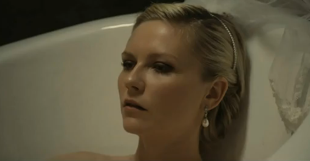Toronto 2011: ‘Melancholia’ and the Challenges of Capturing Depression

The movies tend to shy away from dramatizing depression. Addiction, obsession, madness: Those are a little easier for filmmakers. But nailing the specifics of how depression can slowly but persistently wear down a soul? That's a lot tougher, partly because it's such an inwardly focused malady. That's why Lars von Trier's "Melancholia" is so notable. It's a bit of a mess of a movie, but it feels like it came straight from von Trier's heart.
Depression is something von Trier knows all too well. He's mentioned that before he started writing the script for 2009's "Antichrist," he fell into a deep funk that made him unable to work for about six months. Then as an exercise, he came up with "Antichrist," a film about romantic relationships and madness that seemed to rush straight out of his psyche, which partially explained why it didn't all add up logically. Now with "Melancholia," depression moves to the forefront, and while Kirsten Dunst won the Best Actress prize at Cannes this summer, she and her co-star Charlotte Gainsbourg are in some ways equal partners in the film's limited success.
Dunst plays Justine, the movie's quietly flailing new bride who's trying to keep her smile plastered on while inside she's suffering. When we first see her, she's radiant in her wedding dress heading over to the reception with her husband Michael (Alexander Skarsgard). But as the night wears on, it becomes progressively clearer that the momentary joy of her nuptials can barely hold back the flood waters of melancholy washing over her. By contrast, Justine's sister Claire (Gainsbourg, who was the Best Actress prize at Cannes for "Antichrist") is a smart, put-together woman, although it's obvious that she's tortured in her own way: She's afraid of Claire's depression, as if it's a cold she could catch.
What does any of this have to do with a planet called Melancholia that's on a collision course with Earth? Maybe too much: While "Melancholia" is a sort-of disaster movie, von Trier is more interested in how people destroy themselves emotionally (and how much they fear depression) than how cool it is when recognizable landmarks blow up. But the film's best parts are with Dunst and Gainsbourg as they both cope with the disease that's plaguing Justine. Part of the trick to Dunst's performance is that she doesn't mind if you don't like Justine. In some ways like Dunst's role in "Crazy/Beautiful," Justine's a wreck and a handful, and you just know she's gone through life breaking the hearts of boyfriends who just wanted to take care of her. But her depression isn't "dramatic" or "cathartic." It sits there, pulling down the corners of her smile or making her unable to even lift her leg to get into the tub. And it causes her to act out in ways that may seem ridiculous, but when you think about the ridiculous ways that von Trier himself has acted out in public, maybe it's not that far-fetched after all.
Even more than "Antichrist," "Melancholia" feels like von Trier's attempt at therapy-through-moviemaking, which you hope helps him. Personally I feel like the story isn't nearly focused enough, but the intentions behind the filmmaking are what's really interesting. Considering how often depressed characters in movies seem to be moving towards inevitable suicide attempts ("The Beaver," "The Royal Tenenbaums," "Girl, Interrupted"), at least "Melancholia" refuses to go for easy dramatic devices. That's why even the potential end of the world doesn't seem like that big a deal: For Justine, it feels like it's ending on a daily basis.

